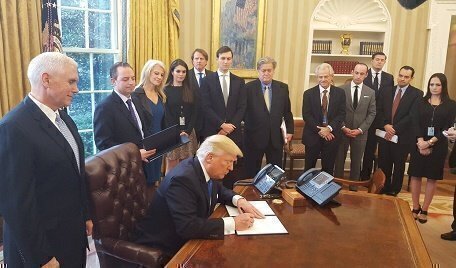Opening its defense in court of the third version of the Trump Administration’s curbs on immigration, government lawyers on Thursday argued that a wide-ranging new study of the issue severs any link to prior anti-Muslim statements by the President or his aides.
 Thus, they argued in a new brief filed in a federal court in Maryland, there is no basis for the new claim that the third executive order is based upon unconstitutional discrimination against religion.
Thus, they argued in a new brief filed in a federal court in Maryland, there is no basis for the new claim that the third executive order is based upon unconstitutional discrimination against religion.
Even if it were true that the now-replaced first two versions had a “religious purpose” (which the government denies), “the specific sequence of events leading” to the latest approach breaks any connection with those earlier orders, the 49-page brief argued.
The new filing, reacting swiftly to three new lawsuits (all of them filed just last week), protested that “no matter how thorough the government’s process” in fashioning the latest restrictions, the challengers “will continue to allege that tpresident’s actions are motivated by animus” – that is, hostility, to people of the Muslim faith.
To make that point about the latest order, the document added, the challengers would have to show bias by a lengthy list of government officials and their aides who took part in “the global review and diplomatic engagement processes” that led to presidential action on September 14. The challengers do not even attempt that, and could not do so, the filing said.
Both of President Trump’s prior versions of the restrictions on entry into the U.S. by foreign nationals from Mideast nations and on entry by refugees from around the globe were ruled invalid, either under the Constitution or under federal immigration law. The Supreme Court itself has not ruled on the legality, since it is bypassing its planned review of the second version because of the substitution of the third approach.
The third order, the new brief contended, represents a clear break with the approaches taken earlier. The document describes in detail a worldwide review it says was undertaken of just how reliable other countries would be in supplying the U.S. government with information on how they would screen their citizens who might travel to the U.S.
It was only after that country-by-country study, the government contended, that the President and his aides came up with the latest order, which is tailored specifically to the situations in each of the eight nations now covered, in various ways, by the restrictions. (The new restrictions, unlike those in the two prior versions, are not temporary, but rather are intended to be permanent – although the government noted that the third order allows for exceptions, on a person-by-person basis.)
Aside from trying to thwart the new constitutional challenge to the President’s latest initiative, the new brief contended that the lawsuits just filed are premature. No individual has been denied a visa to enter the U.S. under the new order, so there is no final agency action for a court to review.
In any event, the Administration’s lawyers renew an argument they had made in trying to fend off earlier challenges: that the courts simply have no authority to look behind a presidential order restricting the entry of foreign individuals into the U.S., once it is shown that the president had national security and foreign policy goals in mind in fashioning the restrictions.
The three lawsuits include a new set of claims by the same challengers who had succeeded in getting a federal appeals court ruling against the second version (the first version was simply abandoned by the government after it was struck down in court). In addition, two completely new challenges were put forth in the other two lawsuits to which the government responded on Thursday.
All three cases are being handled by U.S. District Judge Theodore G. Chuang of Greenbelt, MD. He is one of the judges who ruled against the second version. The two new lawsuits were assigned to him, along with the revised version of the other lawsuit, because all three raise the same legal and constitutional issues. Judge Chuang is scheduled to hold a hearing on those cases next Monday afternoon in the Greenbelt courthouse.
Meanwhile, in Honolulu, U.S. District Judge Derrick K. Watson – who also had ruled against the Administration’s second version – is overseeing a challenge to the third version by the state of Hawaii. Judge Watson plans to rule without holding a hearing, based upon written briefs that are being filed this week.






